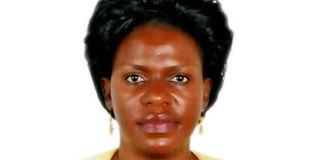Fighting Covid-19: Let’s leave no one behind

Sylvia Muwebwa Ntambi
What you need to know:
Inclusiveness. We, and different stakeholders, as well as other agencies, contend that whereas a lot is being done to fight this pandemic, some more measures need to be taken to avert discrimination, marginalisation and victimisation, some of which may manifest inadvertently.
The Equal Opportunities Commission is mandated to give effect to the State’s constitutional mandate to eliminate discrimination and inequalities in all spheres of life, be it political, economic, social or cultural, against any individual or group of persons and take affirmative action in favour of groups marginalised for the purpose of redressing imbalances which exist against them.
Amid the Covid-19 crisis, it is gratifying to see many people coming out to voluntarily render help to the vulnerable and support government in its primary role of keeping all citizens safe.
Government has made critical decisions and taken strict measures to fight the spread of the virus.
In the circumstances, however, it is debatable whether all initiatives have struck a balance between public safety and socio-economic interests on the one hand, with observance and promotion of inclusion, equal opportunities and non-discrimination on the other hand.
As we take steps to fight the spread of the virus, we need to factor in equal opportunities and affirmative action for the most vulnerable individuals and groups, given that the effects of most of the measures against coronavirus doesn’t discriminate but impact people differently.
The precautionary measures extended during these unprecedented times are designed to protect us during the vulnerable situations and safeguard our future. They have significant implications for the entire population, but as they come into effect, there is need to carefully consider the specific impact they bear on the groups that are already disadvantaged.
The Commission recognises the efforts that government and other stakeholders have put forward to disseminate information about the Covid-19 pandemic. However, the current mode of relaying this information has excluded some masses and various groups of people, especially those in rural areas, persons with disabilities, older persons, illiterate people and young people.
In a bid to keep all Ugandans abreast with the health crisis, we implore the concerned government departments and the private sector to ensure accurate, inclusive and up-to-date information about the virus, access to healthcare services, social and security services, among other aspects of the response to the outbreak to be made readily and equitably available to all.
The information should be availed in various local languages, with qualified sign language interpretation, including televised announcements; accessible websites to all the people with visual, hearing and learning impairments; telephone- based services (text messages).
Age-appropriate information should also be provided to children to enable them take proper and safe steps to protect themselves. All these messages should be interpreted in various local languages for the benefit of both the rural and urban population for better safe guards.
The Commission has noted with gratitude the support given to some health facilities and health workers, whose wellbeing needs no qualms. However, we are concerned that many health workers and facilities have no sufficient health equipment and protective gear.
We hereby remind government and all the other concerned stakeholders that this crisis requires that a lot of attention is given to the various healthcare service providers and everyone involved in the Covid-19 response and at risk of contracting the virus.
There have been reports of health workers complaining and actually some abandoning work due to lack of protective gear such as masks and gloves, besides allowances. The Health ministry has to ensure health workers, who are at the forefront of the battle to contain this pandemic, are well protected and facilitated.
The impact of the pandemic has, indeed, brought about changes in the schooling routine, which has a profound impact on all the learners. Considering equity while addressing some of the educational needs has never been more critical than now.
The Commission commends government’s effort of initiating home schooling programmes as a proactive measure to keep the education services in motion.
We, however, recommend that government adopts more equitable measures to mitigate the effects on learners who already experience barriers to education or who are marginalised for various reasons, including children with disabilities, those affected by location (islands and mountainous areas), their family situations and other inequalities.
The situation also requires involving students mostly at risk through the various local government structures and ensuring that the reading materials reach the learners equitably.
In addition to all the other shortfalls, it has also been noted that external and self stigma are manifest among some of the people who are infected or suspected to be infected with the virus.
Some Covid-19 recovered cases returning to their communities, the isolated cases of runaways who have not yet served their quarantine, and those suspected to be carriers of coronavirus, have fallen prey to some anxious and apprehensive communities who have stigmatised or battered them.
While isolation is a critical approach in this battle, it should not degenerate into discrimination or some form of psychological torture.
Government and other stakeholders should take deliberate steps to ensure that such people are protected and their freedoms and rights are not violated. Therefore, the commission and different stakeholders, as well as other agencies, contend that whereas a lot is being done to fight this pandemic, some more measures need to be taken to avert discrimination, marginalisation and victimisation, some of which may manifest inadvertently.
During this period of the lockdown, there have been a notable increase in the cases of domestic violence, mostly impacting women and children and some few men.
Concerted efforts are required from government and civil society organisations, as well as other stakeholders at the forefront of fighting gender-based violence to intervene through sensitisation, access to social justice, police availing protection to the victims.




